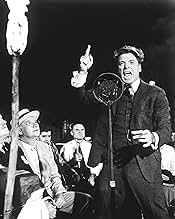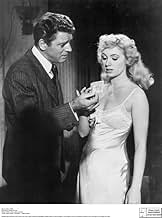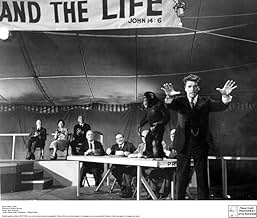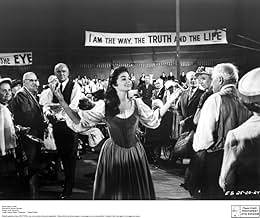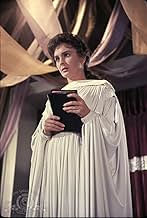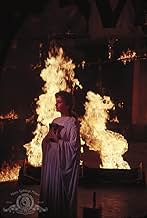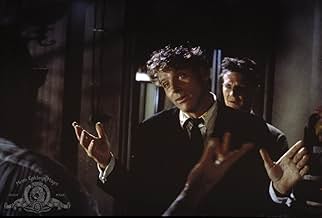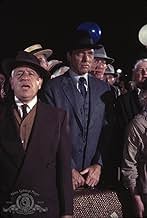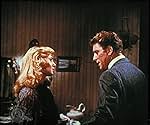- Won 3 Oscars
- 11 wins & 14 nominations total
Edward Andrews
- George F. Babbitt
- (as Ed Andrews)
Harry Antrim
- Salesman in Saloon
- (uncredited)
Larry J. Blake
- Mac - Bartender
- (uncredited)
Phil Bloom
- Cornerman
- (uncredited)
Paul Bradley
- Congregation Member
- (uncredited)
- Director
- Writers
- All cast & crew
- Production, box office & more at IMDbPro
Featured reviews
I just spend two days at my best friends' home for his father's funerals, and during the obligatory moments of life contemplation, we were wondering what was awaiting us all. I guess it's hard to imagine that your beloved one has faded into nothingness, so religion brings you a certain psychological comfort in knowing that there's such a thing as a soul and that, depending on a man's life, it gets the treatment it deserves. Yes, sir-ree, it might feel simplistic but at least it's fair and square.
I think this logic might explain why revivalism is so fervent in America, most of the small-town folks wouldn't fancy an alternative to an after-world where the good isn't rewarded and the evil punished, God fabricated men in its own image so it's only fair that men built a society that works in the same way than God, even if God can act in mysterious ways... let's face it, even the most sophisticated ones of us wouldn't figure out a universe where religion, as complex as it is, wouldn't be easy to "pitch", no matter how tempting agnosticism could be.
This is why promoting revivalism in the hearts of Americans isn't the most difficult thing to operate, it all comes down to telling people that they're going to burn in hell if they sin and to save their souls if they repent, people are ready to hear that if the words come from the right mouths, it's like a good cop/bad cop routine. In Richard Brooks' "Elmer Gantry", adapted from the novel of the same name by Sinclair Lewis, the good cop is Jean Simmons as Sister Sharon Falconer, a saintly revivalist who talks in sweet and delicate prose, and handles her followers and her endeavor like a businessman would do, and there's the bad cop, but one hell of a smooth-talker named Elmer Gantry.
In the original novel, he was an ordained Minister, in the film, in order to appease the Hays Code, he's an ex-Bible salesman who learned the voices of Gospel from scratch and is capable to infuse Bible passages in every monologue, with a grin that would convince the devil himself to sing Halleluiah. To call Gantry charismatic is an understatement, the casting of Burt Lancaster is perfect if only for providing him that irresistible smile, one so charming that it can get away with the scariest threats or allow an improvised line about love to become his catchphrase and play like a running gag all through the film.
What works even better in Lancaster's performance is that his intents are rarely clear and a big cloud of mystery floats around his solid shoulders. His character-establishing moment occurs when he convinces a bunch of drunkards to give charity money to old Christian ladies during a Xmas celebration. With his smile, he manages to skim money off a few piles without even asking, working like the gangster who'd get anything with a smile rather than a threat. Before, he was telling naughty jokes and after, he would have sex with Lulu Baines (Shirley Jones), a hooker who couldn't resist his words, a move that would backfire at him later. Gantry is irresistible indeed, but he's a swindler and I'd say about him what I say about Fellini's "Bidone", before you find them sympathetic, keep in mind it's part of their job.
So Gantry drifts from a place to another until he meets Sister Shara and has an epiphany. He cons her into believing he can attract the crowds with a "saved salesman" speech, Gantry brings crowds indeed and makes arrangements with Zenith church leaders, convincing her that religion must be a spectacle and must bring money in order to survive, and then we get to a second act where it's all about the spectacular improvisation of Lancaster and the professional talent of Simmons, religion turns out to be a big circus, where even the enthusiasm of the audience is part of the show. Lancaster and Jones won the Oscar but Jean Simmons was sure robbed of a nomination and even Arthur Kennedy as the no-nonense big-city reporter Lefferts had a few interesting sequences as the man of reason in the midst of that huge cacophony.
Yes, because there's a lot of noise in the film and this is why it never ceases to be entertaining, so many speeches like a "Network" of the 60s, the noise of religious frenzy, of media craving for sensationalism, of cheering and booing, of "Glory Glory Halleluiah", the film was directed the same year than "Inherit the Wind" but the handling of religion and religious figures is in such a hyperbolic way we might suffer from dizziness, especially when romantic feelings get mixed up and the film culminates with a third act where the ugliness implodes on everyone, what goes around...
This all leads to the inevitable confrontation between good ol' truth and ol' time religion... but the film (like "Inherit the Wind") tries to give the two sides a fair trial, even avoiding to make a total scam out of Gantry and keep him sympathetic even when he's truly guilty of manipulation. But isn't it all about manipulation after all? Media, businessmen, corporations, public opinion, religion, are all institutions guided by noble intentions but that couldn't keep on going without money. Some things exist because they have to... and because they need to exist must count on the shadiest ambassadors, ironically, Gantry was the most human of all, especially with his weakness for a good drink.
The film explores all the facets and allows each side to be given a fair treatment but it also shines by its punchy script, gutsy approach and an unforgettable performance by Burt Lancaster aka "The Grin", a hard-drinking fellow who embodied an aspect of religion that can echo Homer's statement about alcohol as the cause and the solution to all men's problem. Cheers!
I think this logic might explain why revivalism is so fervent in America, most of the small-town folks wouldn't fancy an alternative to an after-world where the good isn't rewarded and the evil punished, God fabricated men in its own image so it's only fair that men built a society that works in the same way than God, even if God can act in mysterious ways... let's face it, even the most sophisticated ones of us wouldn't figure out a universe where religion, as complex as it is, wouldn't be easy to "pitch", no matter how tempting agnosticism could be.
This is why promoting revivalism in the hearts of Americans isn't the most difficult thing to operate, it all comes down to telling people that they're going to burn in hell if they sin and to save their souls if they repent, people are ready to hear that if the words come from the right mouths, it's like a good cop/bad cop routine. In Richard Brooks' "Elmer Gantry", adapted from the novel of the same name by Sinclair Lewis, the good cop is Jean Simmons as Sister Sharon Falconer, a saintly revivalist who talks in sweet and delicate prose, and handles her followers and her endeavor like a businessman would do, and there's the bad cop, but one hell of a smooth-talker named Elmer Gantry.
In the original novel, he was an ordained Minister, in the film, in order to appease the Hays Code, he's an ex-Bible salesman who learned the voices of Gospel from scratch and is capable to infuse Bible passages in every monologue, with a grin that would convince the devil himself to sing Halleluiah. To call Gantry charismatic is an understatement, the casting of Burt Lancaster is perfect if only for providing him that irresistible smile, one so charming that it can get away with the scariest threats or allow an improvised line about love to become his catchphrase and play like a running gag all through the film.
What works even better in Lancaster's performance is that his intents are rarely clear and a big cloud of mystery floats around his solid shoulders. His character-establishing moment occurs when he convinces a bunch of drunkards to give charity money to old Christian ladies during a Xmas celebration. With his smile, he manages to skim money off a few piles without even asking, working like the gangster who'd get anything with a smile rather than a threat. Before, he was telling naughty jokes and after, he would have sex with Lulu Baines (Shirley Jones), a hooker who couldn't resist his words, a move that would backfire at him later. Gantry is irresistible indeed, but he's a swindler and I'd say about him what I say about Fellini's "Bidone", before you find them sympathetic, keep in mind it's part of their job.
So Gantry drifts from a place to another until he meets Sister Shara and has an epiphany. He cons her into believing he can attract the crowds with a "saved salesman" speech, Gantry brings crowds indeed and makes arrangements with Zenith church leaders, convincing her that religion must be a spectacle and must bring money in order to survive, and then we get to a second act where it's all about the spectacular improvisation of Lancaster and the professional talent of Simmons, religion turns out to be a big circus, where even the enthusiasm of the audience is part of the show. Lancaster and Jones won the Oscar but Jean Simmons was sure robbed of a nomination and even Arthur Kennedy as the no-nonense big-city reporter Lefferts had a few interesting sequences as the man of reason in the midst of that huge cacophony.
Yes, because there's a lot of noise in the film and this is why it never ceases to be entertaining, so many speeches like a "Network" of the 60s, the noise of religious frenzy, of media craving for sensationalism, of cheering and booing, of "Glory Glory Halleluiah", the film was directed the same year than "Inherit the Wind" but the handling of religion and religious figures is in such a hyperbolic way we might suffer from dizziness, especially when romantic feelings get mixed up and the film culminates with a third act where the ugliness implodes on everyone, what goes around...
This all leads to the inevitable confrontation between good ol' truth and ol' time religion... but the film (like "Inherit the Wind") tries to give the two sides a fair trial, even avoiding to make a total scam out of Gantry and keep him sympathetic even when he's truly guilty of manipulation. But isn't it all about manipulation after all? Media, businessmen, corporations, public opinion, religion, are all institutions guided by noble intentions but that couldn't keep on going without money. Some things exist because they have to... and because they need to exist must count on the shadiest ambassadors, ironically, Gantry was the most human of all, especially with his weakness for a good drink.
The film explores all the facets and allows each side to be given a fair treatment but it also shines by its punchy script, gutsy approach and an unforgettable performance by Burt Lancaster aka "The Grin", a hard-drinking fellow who embodied an aspect of religion that can echo Homer's statement about alcohol as the cause and the solution to all men's problem. Cheers!
Based on the muckraker Sinclair Lewis' novel, and superbly translated to the screen by Richard Brooks (In Cold Blood , The Professionals, Cat on a Hot Tin Roof), this story of huckster-ism by religion is a masterpiece.
Burt Lancaster player the greatest role of his career, getting his only Oscar for his performance. Lancaster, so good in such films as From Here to Eternity, Atlantic City, and Seven Days in May, was spellbinding as the salesman for God.
Shirley Jones (The Music Man, "The Patridge Family," was simply delicious as Gantry's first conquest, and now a "five-buck hooker," that he left behind: "Oh, he gave me special instructions back of the pulpit Christmas Eve. He got to howlin' "Repent! Repent!" and I got to moanin' "Save me! Save me!" and the first thing I know he rammed the fear of God into me so fast I never heard my old man's footsteps!" 1960 was a great year for movies, and this was certainly one of the best of that year, and one of the best of all time. If you want to see real acting, this film should be on your "must-see" list.
Burt Lancaster player the greatest role of his career, getting his only Oscar for his performance. Lancaster, so good in such films as From Here to Eternity, Atlantic City, and Seven Days in May, was spellbinding as the salesman for God.
Shirley Jones (The Music Man, "The Patridge Family," was simply delicious as Gantry's first conquest, and now a "five-buck hooker," that he left behind: "Oh, he gave me special instructions back of the pulpit Christmas Eve. He got to howlin' "Repent! Repent!" and I got to moanin' "Save me! Save me!" and the first thing I know he rammed the fear of God into me so fast I never heard my old man's footsteps!" 1960 was a great year for movies, and this was certainly one of the best of that year, and one of the best of all time. If you want to see real acting, this film should be on your "must-see" list.
For some reason Richard Brooks seemed to think of himself as the man best suited to turning great novels and plays into films, but if the results were at best entertaining ("The Brothers Karamazov", "Cat on a hot tin roof") they tended to fall far short of the originals. If "Elmer Gantry" worked better than most was largely due to Brooks ability to tell a rattling good yarn at a cracking pace and to the performances of a superb cast.
Burt Lancaster seemed born to play the role of the lustful traveling salesman whose desire for the Aimee Semple McPhearson-like Sister Sharon turns him into a charismatic preacher, (his performance here is a virtual reprise of his performance as Starbuck in "The Rainmaker" a few years earlier). As Sharon, Jean Simmons gives a luminous performance, all fragility and repressed sexuality and singer Shirley Jones is a revelation as a trampy prostitute; (both she and Lancaster were rewarded with Oscars). Not great then, but several cuts above what it might have been.
Burt Lancaster seemed born to play the role of the lustful traveling salesman whose desire for the Aimee Semple McPhearson-like Sister Sharon turns him into a charismatic preacher, (his performance here is a virtual reprise of his performance as Starbuck in "The Rainmaker" a few years earlier). As Sharon, Jean Simmons gives a luminous performance, all fragility and repressed sexuality and singer Shirley Jones is a revelation as a trampy prostitute; (both she and Lancaster were rewarded with Oscars). Not great then, but several cuts above what it might have been.
Honestly, I don't know where to begin because there were a lot of things that I loved about watching this film Elmer Gantry (1960). There were so many great elements happening all at once especially the acting. Burt Lancaster did a splendid job and was a perfect choice for the leading role of Elmer Gantry because he featured lots of honest to goodness acting. His energy, enthusiasm, and charismatic appearance made Gantry such a cool character. His acting was most definitely my favorite aspect of the movie because his performance truly brought the movie to life.
My rule for telling whether I watched a good movie or not is by seeing how often I notice the outlining of the screen that the movie is displayed on and I barely noticed it when watching Elmer Gantry because I was so into it. The director of the film, Richard Brooks, did a fine job with choosing the camera angles and transitioning. Take it from someone who loves everything about film and is trying to become a prominent film director when I say you can learn a lot from watching Mr.Brooks film. Brooks displayed professional frame balance practically throughout every scene.
Overall, after watching Citizen Kane I kinda became bored of watching old-school films but Elmer Gantry has restored my enjoyment of old- school films once again. I just began enjoying older films a lot more than what is being produced today in the film world. I thought the script for Elmer Gantry was exceptional; I loved every quote in the movie especially, "One minute you're a howling banshee,the next, you're cold potatoes." Everyone should watch Elmer Gantry because it is simply a great movie.
My rule for telling whether I watched a good movie or not is by seeing how often I notice the outlining of the screen that the movie is displayed on and I barely noticed it when watching Elmer Gantry because I was so into it. The director of the film, Richard Brooks, did a fine job with choosing the camera angles and transitioning. Take it from someone who loves everything about film and is trying to become a prominent film director when I say you can learn a lot from watching Mr.Brooks film. Brooks displayed professional frame balance practically throughout every scene.
Overall, after watching Citizen Kane I kinda became bored of watching old-school films but Elmer Gantry has restored my enjoyment of old- school films once again. I just began enjoying older films a lot more than what is being produced today in the film world. I thought the script for Elmer Gantry was exceptional; I loved every quote in the movie especially, "One minute you're a howling banshee,the next, you're cold potatoes." Everyone should watch Elmer Gantry because it is simply a great movie.
From the exceptionally talented pen of noted author Sinclair Lewis comes this entertaining story of a fast-talking, yarn-spinning vacuum salesman with the natural gift of persuasion. In his ever lustful sights is a voluptuous female preacher. In order to conquer her, he must use his extensive repertoire of biblical quips, quotes and bawdy antidotes. Within the sphere of a traveling troupe of bible beating, evangelicals on a religious crusade, the author's hero, one Elmer Gantry (supurbly played by Oscar wining Burt Lancaster) is as energetic as his tales. Although it's difficult to know if Gantry's spiritual motivation is genuine or merely a ploy, throughout the film, one is kept guessing. The target of his earthly desires is Beautiful Sister Sharon Falconer (Jean Simmons) a sincere, but fallible woman out to build a ministry. A serious obstacle to her goal is Gantry, but more so is the cautionary and caustic pen of Jim Lefferts (Arthur Kennedy), a Pulitzer Prize winning journalist who questions the personal and financial motives of her entourage. Her main supporter is worldly William Morgan (Dean Jagger) who believes in Falconer, and sees Gantry and Lefferts for the opportunistic impediments they are. The film is a triumph for Lancaster and Kennedy and for all those who wish to visit a confusing period of Americanna, when the word of God was infected by preachers, pushers and spiritual leeches. ****
Did you know
- TriviaWhen he first learned that Richard Brooks was interested in adapting his novel, Sinclair Lewis told him that he should change it significantly, advising him to read all the criticisms of the book and use them as a way to improve on it.
- GoofsThe location where Sister Sharon confronts the police captain and fire chief over erecting her tent is purported to be in Lincoln Nebraska. The opening part of the scene shows mountains in the background. There are no mountains around Lincoln.
- Quotes
Lulu Bains: Oh, he gave me special instructions back of the pulpit Christmas Eve. He got to howlin' "Repent! Repent!" and I got to moanin' "Save me! Save me!" and the first thing I know he rammed the fear of God into me so fast I never heard my old man's footsteps!
- Crazy creditsScrolled before the opening credits: "We believe that certain aspects of Revivalism can bear examination- that the conduct of some revivalists makes a mockery of the traditional beliefs and practices of organized Christianity! We believe that everyone has a right to worship according to his conscience, but- Freedom of Religion is not license to abuse the faith of the people! However, due to the highly controversial nature of this film, we strongly urge you to prevent impressionable children from seeing it!"
- ConnectionsFeatured in Hollywood: The Fabulous Era (1962)
- SoundtracksI'm On My Way to Canaan Land
(uncredited)
Traditional
Arranged by Mahalia Jackson
Sung by Patti Page and the audience at a revival meeting
Reprised by her at the end
- How long is Elmer Gantry?Powered by Alexa
Details
- Release date
- Country of origin
- Language
- Also known as
- Elmer Gantry, ni bendito ni maldito
- Filming locations
- Production company
- See more company credits at IMDbPro
Box office
- Budget
- $3,000,000 (estimated)
- Gross worldwide
- $64
- Runtime
- 2h 26m(146 min)
- Aspect ratio
- 1.66 : 1
Contribute to this page
Suggest an edit or add missing content


